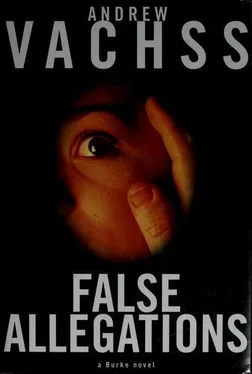So maybe my mother's mother hadn't…I threw that thought into the garbage can I keep in my mind for things like that, looked him in the face and took him back to Jennifer Dalton: "What if this 'reward' gets thin after a while?" I asked him.
"Thin?"
"Like dope. After a while, what used to get you high doesn't even get you off the ground."
"Dose–related, right," he agreed. "Are you asking if—?"
"If pulling didn't give her enough, make her feel good enough, could she start cutting on herself?"
"That happens sometimes," he answered, temporizing. "It's not always so progressive—we don't see that all the time. It does happen, but…"
"But it's rare, right?"
"Trichotillomania is rare, sure. So is self–mutilation. Pain signals have the ability to turn on the brain's endorphins, like I said earlier. Children living in a constant state of terror may overdevelop those systems, like a bodybuilder overtaxing a muscle to make it grow. The more you use any part of the brain, the more it develops. So instead of feeling more 'pain' when they pull their hair or cut themselves, they actually feel more soothed. Their brain systems are organized differently from the rest of us."
That's you , not us , I thought, thinking how violence had soothed me so many times when I was younger. Not my pain; someone else's. Sometimes anyone else's…
"What we're looking for is…plausibility," he continued. "A set of circumstances that could account for high vulnerability. We look for evidence in the individual's ability to give their own history…and then we look for 'dissociative' gaps," he said, using two fingers tapping against each thumb to make quote marks around the word, "spaces where recollection of key experiences is fuzzy, incomplete—or even missing entirely."
"Liars would have spaces in their memory too," I reminded him.
"Not usually," he said. "In fact, skilled liars, malingerers—we would call them—often display a richness of detail that the average, honest person might not."
I filed that one away—a professional never stops learning.
"The brain stores traumatic experiences differently from others," Perry went on. "Because when the brain is in a state of alarm, it pays attention. So words are stored much less efficiently than the nonverbal signals that are important to survival—facial expressions, body movements, sounds, smells. We remember trauma at some level, but suppression is a factor in that equation too. Recall is scattered—the resulting narrative isn't always linear or precise. So we don't rely on it totally. We try to determine how an individual feels about specific traumatic events…and whether they can identify trauma–related cues. That's why we use self–report forms too."
"You mean what patients say about themselves?"
"Yes, and the usual standard psychological tests as well. We want to examine various aspects of the patient's personality—coping styles, IQ, the themes of the patient's inner world…hopes, fears, wishes…. But in this case, we have hypnotically refreshed memory, and that raises some other issues."
"Like…?"
"We use the Stanford Susceptibility Index—we want to know if the patient is easily hypnotized."
"You can tell that from the way they answer questions on a test?"
"No," he said. "Here, let me show you. Follow my finger with your eyes."
He moved it left, right, up, down, finally looping his finger all the way up, way past my vision. "Okay, now, without following my finger, roll your eyes up as far as they can go.
I did it.
"So?" I asked him.
"Generally, the more white exposed on the extreme eye–rolls, the more susceptible to hypnosis the patient is."
"How'd I do?"
"Fine," he said, something flitting quickly across his face. "We also need a sleep history," he said quickly. "If the patient has chronic difficulty falling asleep, or wakes up suddenly—especially about three hours after they fall asleep—we have some indication of dysregulation of the noradrenergic system."
I wanted to ask him if he had an English–speaking translator on the grounds, but I settled for: "Nora–what?"
"Norepinephrine is a chemical—like the other chemicals I talked about for the reward systems—only these noradrenergic systems are the main mediators of the fear response. And when someone is exposed to traumatic stress—especially in childhood when those systems are first organizing—those systems become hyperreactive."
"Even when the kid's asleep?"
"If the whole environment is stressful, sure. The key is the heart—it's only one synapse away from the brain. Trauma increases the heart rate. If the environment is heavily laced with trauma, you get an overreaction to even the most simple stressors…and that brings on a major change in functioning. You see it in all traumatized individuals: anxiety, impulsivity, depression, aggression…even dissociation."
"So you put them on an EKG machine and wait for…?"
"Pretty close. Actually, the instrument we use looks like a wristwatch; kids get used to it in seconds. When we—or they—bring up a traumatic topic, the heart rate increases. And when the internal anxiety gets high enough, the brain has to 'act,'" he said, making the quote–marks sign again, "and this can be a primary, external behavior—like agitation or aggression—or a primary internal response: freezing, going numb, dissociation. If the response to threat is external, the heart rate stays elevated. But if the response is dissociation, the heart rate plateaus…and ultimately decreases. We can actually track this, in association with specific cues. And with time–sequenced video, we get a very precise assessment of what topics and what cues and what stimuli are associated with a deeply ingrained memory…the memory of the state of fear present in the original trauma." He took a deep breath. "Is any of this making any sense to you?" he asked in an apologetic tone. Perry used language in exactly the opposite way lawyers did—he didn't want to hide behind it; he wanted you to get it. A fucking genius without being arrogant, explaining the meaning of life with that "aw, shucks" farmboy front—he must be a killer on the fund–raising circuit.
"A normal person gets scared, their heartbeat goes up," I told him. "Eventually, that calms them. If they've been abused, the heart rate just keeps climbing until they go somewhere else in their heads. To a safe place. Then the heartbeat slows down. Like the tail wagging the dog," I said softly. Thinking how I learned to do it for myself: staring at a red dot on my mirror, going into that dot until I wasn't afraid anymore. I didn't get all his vocabulary, but if you translated it, every abused kid in the world would recognize it.
He nodded, not saying anything.
I stayed quiet too, listening for my own heartbeat.
The hotel was set up right inside the hospital complex. For families who wanted to stay around while a patient was hospitalized, Perry told me. That way they could be close at hand, feel more a part of the process. I figured I'd stay there too, took a two–room suite for the duration.
After I unpacked, I took a stroll until I found a pay phone and called Mama.
"All quiet," she said. "You okay?"
"Sure," I told her. I gave her the number of the hotel room, just in case.
I went back, took a shower, and started reading over some of the material Perry had given me, wishing I'd brought my medical dictionary along. I started reading this stuff years ago, swiping books from Doc's library in the prison. Doc never admitted he knew what I was up to, but whenever he left a book lying around for too long, I knew he meant me to take it. Maybe if he knew I was running a nice little business writing phony psych reports another inmate clerk substituted for the real ones that went to the parole board, he wouldn't have been so eager to further my education.
Читать дальше











